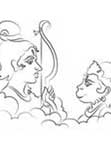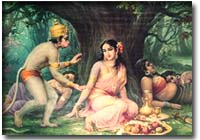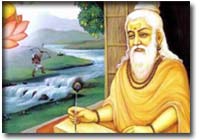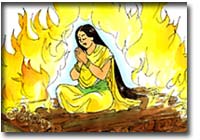YUDDHA KANDAM
 |

In Lanka, Ravana's position was awkward. He was ashamed of the exploits of Anjenaya. Fear of impending trouble disturbed his mind. He was informed of the movement of Sugreeva's army to the opposite shore. He would somehow manage to infiltrate into the island. Rama was the sworn enemy. For all these reasons he called for a council of ministers and invited their opinion on the grave situation that was thwarting Lanka. Supplementing one another all the ministers and commanders struck the same note that Ravana was invincible in all the three worlds, that Indrajit or anyone of the generals was sufficient to wipe out the whole of the monkey forces and to defeat and kill Rama and Lakshmana. Vibheeshana the youngest brother of Ravana was the only person who struck a dissident note. With the due reverence to the eldest brother and in clear terms, he pointed out that what Rama did was in self defence. There was neither virtue nor justification in Ravana's stealing away Sita. The enemy's strength was not truly known. Lanka's strength was over estimated. Hanuman's action in Lanka were fore warnings. In these circumstances a peaceful and honourable return of Sita to her husband was the safest course. Delay in this respect would be disastrous. Ravana gave a patient hearing to this counsel. Then he dissolved the council in order to get time for consideration. The virtue imbued youngest brother again called all alone on the lust laden eldest brother, prostrated before him and pleaded with him, "Ever since you brought Sita captive into Lanka, its prosperity is rapidly waning, its magnificence is fading. Inauspicious omens are in evidence everywhere. These are not only my observations but also of many discerning citizens.

The delay in Rama's discharge of arrows is your extra span of life. You are my brother. In spite of your blunders I am ever yours. I have resolved to kill Rama and Lakshmana. When my decision bears fruit you enjoy Sita to your hearts' content. Ravana explained his position, "I am prevented from knowing Sita. I may take a woman captive. But if I test her modesty against her consent my head will burst into pieces. That is the curse inflicted on me by Brahma, the creator." Prahstha recounted the invincible strength of Ravana. The flattery tickled the king's vanity. The assembly applauded the chief counsellor's speech. Vibheeshana was the solitary figure who did not join in the applause. He warned his royal brother of the impending death and of the destruction of Lanka. In clear and unmistakable terms he defined the divine valour of Rama. Indrajit disliked this note of warning made by his uncle. He blurted out, "I am ashamed of my uncle's cowardice. He lacks the mettle of our race. We are not meekly submitting to his proposal. Vibheeshana's so-called warning is an insult to the people of Lanka." Vibheeshana gave him the calm reply, "You are still inexperienced. Strength without virtue leads to damnation. You and the ministers are party to your father's wickedness. You are all heading towards annihilation. Because of love for my people I oppose your evil designs." Now Ravana got enraged. He thundered, "One may live with sworn enemies and with serpents, but never with treacherous brothers and cousins.

Angada the monkey prince came out with his views. He said, "The rakshasas are rash and foolhardy. Sometimes they are capable of doing good in their own violent way. If we can utilize this brother of Ravana and his four men to serve our anti rakshasa purpose we shall absorb them. If that is not possible we shall turn them out." Sarabha submitted that an expert detective might be engaged to probe into the demon's motif. On the basis of his findings the refugee was to be treated. Jambhavan who was well versed in the lore of sacred books presented his opinion, "The brother of Ravana our enemy has come out to a wrong place at an improper time seeking our friendship. Therefore his arrival should be viewed with suspicion." Now Anjenaya' turn came, "I do not speak to display my earning or the talent of debate. What is expedient, that I place before you. The enemy becomes weak if the best of his men alienates from him and allies with us. So the question of killing the refugee does not rise at the outset. Even the wicked can be utilized for virtuous purposes if one knows the art of doing it. In the present state of emergency there is no time to appoint detectives to probe into the mental make-up of the fugitive. The pace and time chosen by Vibheeshana are quite regular. The enormity of the wickedness on the other side is becoming increasingly every day. Taking not of it he has hastened to the right place in the right time.

